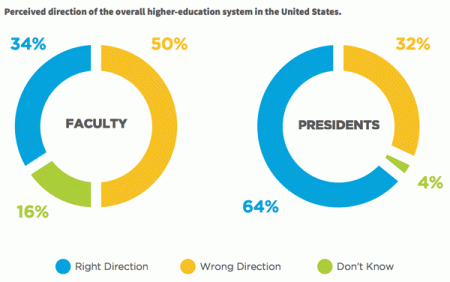Along with other right-thinking people, I have always believed that one should call a person or group whatever they tell you they want to be called. It’s not always straightforward or easy, and one will make mistakes. Those names may change, and the rest of us must gamely try to keep up. But as a fundamental principle of respect, society ought to acknowledge the right of groups and individuals to name themselves.
What, then, to call those people over in the administrative offices?** For decades, centuries even here at UNB, they have been “the administration.” However, they refer to themselves, with characteristic flair, as the “University Management Committee” or UMC, and who are the rest of us to argue? As it turns out, we probably should argue. Whatever they call themselves reflects their vision of the university and the way they intend to interact with the rest of us.
The issue recurred just now while reading a piece in The Chronicle of Higher Education about the pernicious belief that students are “customers”:
Education is created, not consumed, but we cannot expect students to believe that when every message from academe itself tells them that they can just buy it.
In addition, any short-term power that students gain over their professors by introducing a controlling commercial metaphor into the classroom dynamic is more than mitigated by the losses. Faculty members respond to the student-as-consumer by teaching defensively, fearing the management that we formerly referred to as administration. But administrators administrate on behalf of the faculty. Employees delivering customer service get managed. [emphasis added]
This passing reference to administration cum management caught my attention. “[A]dministrators administrate on behalf of the faculty. Employees delivering customer service get managed.” Well I know which sounds better to me and it is not the UMC.
Our collective agreements call us “the union” and them “UNB”, which has always rankled with me as I was here before most of them and, gods willing, will be here long after they have giddily moved on to positions with more reports. The Dalhousie Faculty Association had a wonderful “I AM Dal” campaign that squarely falls in the wish-I-had-thought-of-it-first category, a campaign to highlight the central position of academic staff and students within the institution, to proclaim their shared ownership, and to contest leaving the power to define with one small segment of the Dalhousie community.

Indeed, in our own small way, some of us made the same point, with less typographic flair, during our job action.
Naming is important. Should we call them “the administration” in the hope that perhaps they will decide to live up to the label? Should we call them what they apparently want to be called — management — or would that make us complicit in, or at least resigned to, the ongoing degradation of the University? Or should we drop the euphemisms and recognize, with our use of language, that people capable of threatening to cut off our children’s medical benefits and of hiring an outside security force during a strike are to all intents and purposes on the same continuum as the Cripple Creek mine owners with their Pinkerton guards? CAUT would have us call them, in the spirit of calling a spade a spade, “the Employer.” Some colleagues have, in the past at least, found this a little too, well, industrial. No doubt recent events have clarified things.
Me, I’m mourning the loss of administration. And am I the only one who has noticed that there is no longer a link for “University Governance” on the UNB website? It has been replaced by “University Leadership.” Is “governance,” specifically “shared governance,” to join “administration” in the quaint old storeroom of past glories? Or will the university community exercise its right to name?
________
**I hope it is clear from the context that I am talking about senior administration.


